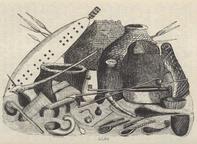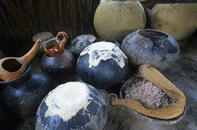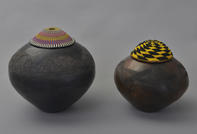In the early 19th century, water-tight baskets rather than clay pots were sometimes used for drinking and storing beer. An engraving in the Rev.

Joseph Shooter’s 1857 account of his work as a missionary in present-day KwaZulu-Natal, illustrated here, included at least six baskets varying in shape and size, some of which are likely to have been used for this purpose. When the Pondo leader, Faku, received the Rev. Francis Owen on his way to Durban in the 1830s he ordered 2 baskets of beer ‘to be placed before’ the missionary.
Little more than a decade later the travelling artist, George Angas, described how the third Zulu king, Mpande, sent him ‘an Induna with a live bullock, an enormous basket of beer (‘outchualla’) - i.e. utshwala - borne by two men, and a jar of Dutch aniseed cordial’, when he visited Mpande’s royal homestead in 1847.
On the other hand, John Ross remembered that on his first visit to Zulu king Shaka in 1825, ‘every evening a large earthen vessel, containing from three to four gallons of beer’ was sent to him and his companions ‘from the king’s private brewery’. This was most probably an imbiza, similar to those made to this day.

Symbolic considerations seem to have informed the widespread replacement of grass vessels with blackened ceramic pots to serve beer at rituals associated with the ancestors, such as births, marriages and deaths. Because the ancestors are known to shun sunlight and bright places, blackening beer pots is one way of ensuring their presence at these ceremonies.
Beer is sometimes lifted out of the pot with a ladle made from a gourd (inkhezo plural: izinkezo), before being consumed from the inkhezo, which is passed round from one person to another. Beer can also be drunk directly from the clay pot or ukhamba.

Among Zulu-speakers beer pots are protected from flies and other insects by covering them with lids (imbenge, plural izimbenge) woven from grass or plastic-coated telephone wire.
More importantly, though, these lids keep light from entering the pots, thereby ensuring that they remain dark, which is an essential requirement when communing with the ancestors. In the thought-patterns of Zulu traditionalists, blackness is said to drive off evil.
This also helps to explain why diviners cover their bones before throwing them, in the process providing darkness for the work the ancestors need to do in guiding the decisions of the living.
By Professor Sandra Klopper